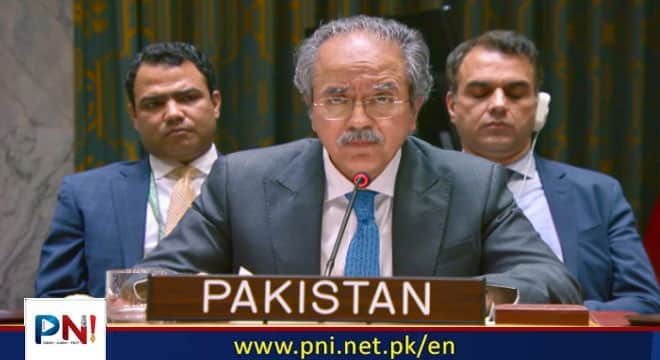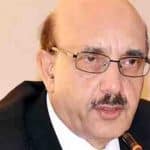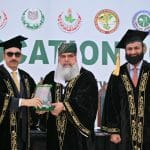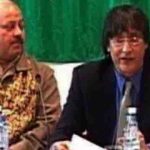UNITED NATIONS, May 16 : A senior Pakistani diplomat told the UN Security Council Thursday that the “acute” matter of missing persons in armed conflict was persisting like a “silent crisis”, as he underscored that absence of such individuals from their loved ones was “a wound that never heals”.
“The issue of missing persons is particularly acute in conflict zones and occupied territories from Palestine to occupied Jammu and Kashmir,” Ambassador Asim Iftikhar Ahmad, permanent representative of Pakistan to the UN, said during a discussion in the 15-member Council on the implementation of its Resolution 2474, which addresses that “critical issue”.
“They are fathers who never returned home, mothers separated from their children, young boys who disappeared in the dead of night, and daughters whose fates are sealed in silence,” he said, adding, “Their absence is a wound that never heals, leaving families trapped in an endless cycle of hope and despair.”
In this regard, the Pakistani envoy said that despite calls for investigations and accountability, the plight of missing persons continues to exacerbate in Indian-Occupied Kashmir, pointing out that after India’s illegal and unilateral actions of 5 August 2019, thousands of young boys were abducted and many still missing.
“The recent terrorist incident in Jammu and Kashmir was used as a pretext to round up more than 2,000 people with the view to further oppress Kashmiris’ struggling for their legitimate right to self-determination,” Ambassador Asim highlighted.
Referring to the unmarked and unknown graves of thousands of victims that have surfaced in recent year, the Pakistani envoy said, “From the investigations held so far, it has been revealed that these victims are first disappeared by Indian occupation forces and then tortured to death or summarily executed.”
The occupying power, he said, continues to be in denial about the thousands of enforced and involuntarily disappeared persons from Kashmir and is reluctant to conduct forensic investigations into the 7,000+ unmarked mass graves.
He said that Office of the High Commissioner for Human Rights (OHCHR), in its two reports of 2018 and 2019 on Kashmir, had recommended to “ensure independent, impartial and credible investigations into all unmarked graves” in occupied Kashmir.
Ambassador Asim said that missing persons and enforced disappearances is a grim and undeniable reality of the decades-old Kashmir conflict.
He also referred to the ongoing tragedy in Gaza, which highlights the devastating impact of armed conflict on missing persons and their families. He said that since October 2023, over 14,000 Palestinians remain unaccounted for, many buried beneath the rubble of destroyed homes, their voices silenced by unrelenting bombardment.
He said that the dire situation demands urgent action to account for every missing person, restore family connections, and uphold the fundamental rights of those lost in the chaos of conflict.
In this regard, Ambassador Asim suggested the following actions:
1)All conflict parties must follow international humanitarian law, protect civilians, and ensure accountability for violations;
2)Member states should strengthen collaboration through legal assistance and data sharing to trace missing persons;
3)Humanitarian organizations, especially the ICRC, must have unrestricted access to conflict zones to assist and support missing persons and their families;
4)The issue of missing persons is a symptom of unresolved conflicts, which need to be addressed, and,
5)Emphasis on conflict prevention and dispute resolution as key to resolving the crisis of missing persons.
“We must work collectively to uphold the dignity and rights of all those affected by conflict and ensure that the missing persons are not forgotten,” the Pakistani envoy added.
Resolution 2474, adopted unanimously in 2019, obliges all parties in conflict to take all appropriate measures to account for the missing, enable the return of their remains, and provide families with information on their loved ones’ fate.
At the outset, Khaled Khiari, Assistant Secretary-General at the UN Department of Political and Peacebuilding Affairs, warned that the crisis of missing persons continues to deepen in conflicts worldwide.
In Ukraine, large numbers of civilians – including children – remain unaccounted for in areas under Russian occupation. In Myanmar, disappearances have surged since the 2021 military coup, amid a lack of due process.
In Syria, the missing persons crisis has become a defining feature of the conflict, Khiari said, noting also that questions remain over the fate of those missing from the 1991 Gulf War, as well as the enduring impacts on families and communities in Cyprus.
Follow the PNI Facebook page for the latest news and updates.








